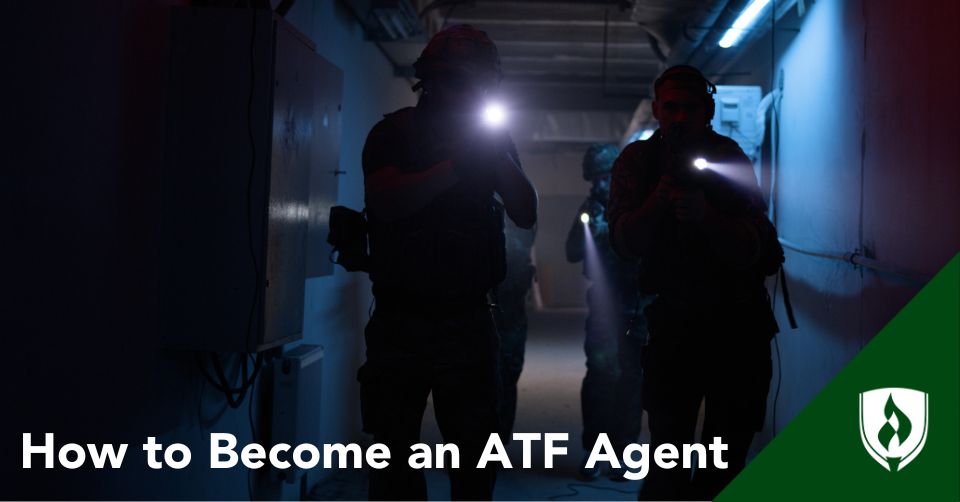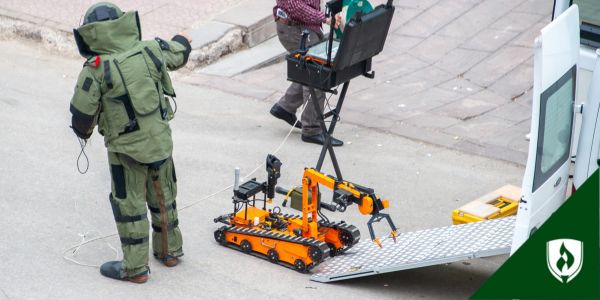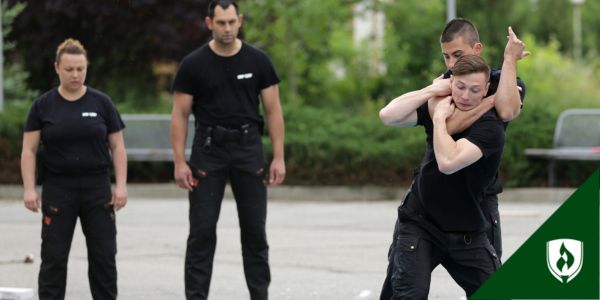
In 2002, special agents from the U.S. Bureau of Alcohol, Tobacco, Firearms and Explosives (ATF) helped thwart a plan to bomb an Islamic education center in Florida.1 That's just one example of how ATF agents protect public safety.
From combating gun running to squashing drug cartels, ATF agents investigate the most dangerous criminals. If you're seeking a career that puts your intellectual and physical prowess to the test every day, you may want to learn about what it’s like to be an ATF agent. ATF stands for the Bureau of Alcohol, Tobacco, Firearms and Explosives, an elite group of special agents who prevent and investigate federal crimes.
What is takes to become an ATF agent
Candidates interested in becoming a special agent with the U.S. Bureau of Alcohol, Tobacco and Firearms must respond to a specific position listed at www.atf.gov or USAJOBS.gov. Here are the Bureau’s initial eligibility criteria requirements:14
- Having U.S. citizenship and eligibility to work for the federal government
- Being between the ages of 21-37
- Having a valid driver's license
- Completion of a bachelor's degree in criminal justice or law enforcement experience (or a combination of both)18
- Being able to secure Top Secret clearance
Working in law enforcement for the federal government is competitive.
Special agents must meet a demanding set of criteria that includes the ATF Special Agent Exam, physical requirements and a rigorous background investigation. Prior to being considered for a job, you must...
- Complete an occupational questionnaire about your background, citizenship status and more3
- Undergo a medical examination by an authorized government physician to demonstrate your ability to perform physically strenuous tasks and check your hearing and vision. Applicants must also successfully pass a drug test.15
- Pass a physical task test, including performing sit-ups, push-ups and a 1 1/2-mile run4
- Pass a written test assessing your knowledge as well as your quantitative reasoning and investigative reasoning skills5
- Participate in a panel interview to gauge your strengths and weaknesses16
- Pass a polygraph test to verify the truthfulness of the information you share17
ATF special agent training
If you succeed in meeting these hurdles, the U.S. Bureau of Alcohol, Tobacco, Firearms and Explosives will send you a "Enter on Duty" letter stating when you are to report to special agent basic training and orientation. Be prepared for this to involve rigorous training.
You'll undergo 12 weeks of training at the Federal Law Enforcement Training Center in Glynco, Georgia and 15 weeks of Special Agent Basic Training. 6,7
Both programs require you to complete tactical training to test your physical skills and rigorous training in academic and legal topics to gauge your practical skills.
The life of an ATF agent
Being an ATF agent is never dull. One day you may be working undercover to infiltrate an organized crime syndicate and the next you're executing search warrants in a firearms trafficking case. As members of the criminal justice system, these special agents are also called upon to support the federal government by testifying in court against suspects in federal crimes.
Leading criminal investigations
One of the major roles of an ATF agent is to conduct investigations into serious violations involving alcohol and tobacco products, firearms as well as arson. In this capacity, they:
- Interview suspects
- Execute search warrants
- Conduct property searches
- Collect and analyze physical evidence
- Seize illegal goods
- Identify firearms and ammunition
As criminal investigators, ATF agents need to be sharp and physically fit. A high degree of integrity, dependability, reasoning and conscientiousness are required to succeed in this role.
Enforcing federal laws
In addition to supporting criminal justice, ATF agents participate in outreach programs to educate the public about federal laws relates to alcohol, tobacco and firearms.2 They also partner with local law enforcement to help combat gangs, gun violence and firearms trafficking.
Working undercover
Fighting federal crimes often requires special agents to work undercover. They may be infiltrating a drug ring, buddying up to a suspected arsonist to gather intelligence or conducting covert operations of firearms trafficking.
Pros and cons of being an ATF agent
There are few jobs as exciting as being an ATF agent, but it definitely comes with its pluses and minuses. For one, special agents need to be keen on traveling a good part of the year and have a lifestyle amenable to relocation. ATF field offices are located across the U.S. and U.S. territories, and agents may be asked to relocate on short notice.
Additionally, agents are in dangerous situations—often.
They need to think on their feet and put their personal safety at risk in the name of protecting public safety. Dealing with criminals day in and day out can also take its toll.
On the plus side, ATF agents have a unique opportunity to make a real difference in people’s lives. They face fears in the name of a greater good. Their work is unique and they have memorable experiences throughout their careers.
ATF agent internship opportunities
ATF is seeking exceptionally fit, professional, solutions-oriented individuals to protect the public. Becoming an ATF agent is a sought-after career. Completing an internship may increase the odds of securing one of these coveted positions.
ATF provides an overview of unpaid internships available in forensic science, the law and related topics. 8 These internships offer the chance to gain practical experience in the criminal justice field and master critical thinking, problem-solving and other essential skills.19
ATF agent levels
There are three levels of special agents:9
- GL-5 is an entry-level role that requires completion of a bachelor's degree in any field of study as well as three years of law enforcement or criminal investigations experience.20
- GL-7 requires completion of a 1+ years of graduate-level education or superior academic achievement such as National Honor Society membership in a bachelor’s degree program, or criminal justice or criminal investigation experience.
- GL-9 is the top-tier role. It requires completion of a master’s degree in criminal justice, psychology, political science or sociology as well as at least a year working in criminal investigative methods or investigations involving fraud.20
ATF specializations
In addition to conducting criminal investigations involving tobacco, firearms and explosives, ATF agents may secure work in specialized career tracks,13 including:
- Criminal Profilers - Support federal law enforcement by developing criminal profiles of suspects
- Special Agent Canine Handlers - Lead dogs trained to detect shell casings, explosive devices and firearms
- Explosives Enforcement Officers - Ensure that bombs and similar devices are disassembled and safe, and document explosive device evidence for criminal justice cases
- Certified Explosives Specialists - Provide explosive identification and disposal and conduct criminal investigations into unlawful explosives
- Certified Fire Investigators - Are among the first on the scene to examine potential criminal scenes, identifying and collecting evidence to support arson charges
Experienced special agents may also apply to join elite teams, such as:
- International Response Teams, who support the U.S. Department of State on high-profile arson and explosion cases in foreign countries
- National Response Teams of special agents, forensic scientists and law enforcement officers who respond rapidly across the U.S. to arson and explosives cases
- Special Response Teams who are deployed within hours to high-risk scenarios such as hostage situations and terror attacks, working to capture those responsible
Is a career as an ATF agent for you?
As you can see, these roles take time and experience to work toward. But the experiences you gain as you work toward a federal law enforcement job are just as interesting and essential as the job itself.
If you’re serious about a job like this, you need to begin with a strong foundation: a bachelor’s degree or law enforcement experience.
Check out What Should I Know Before Studying Criminal Justice? 10 Things to Keep in Mind to see if a bachelor’s degree in this field would suit your goals.
1Bureau of Alcohol, Tobacco, Firearms and Explosives website, viewed 6/6/25, https://www.atf.gov/our-history/historical-articles/goldstein-case
2Bureau of Alcohol, Tobacco, Firearms and Explosives website, Community Outreach page, viewed 6/6/25, https://www.atf.gov/about/community-outreach#:~:text=ATF%20partners%20with%20the%20private,help%20keep%20our%20communities%20safe.
3Bureau of Alcohol, Tobacco, Firearms and Explosives website, ATF Form 5400.28, viewed 6/6/25, https://www.atf.gov/explosives/docs/form/employee-possessor-questionnaire-atf-form-540028
4Bureau of Alcohol, Tobacco, Firearms and Explosives website, Pre-Employment Physical Task Test page, viewed 6/6/25, https://www.atf.gov/careers/pre-employment-physical-task-test
5Bureau of Alcohol, Tobacco, Firearms and Explosives website, Preparing for the ATF Special Agent Exam page, viewed 6/6/25, https://www.atf.gov/careers/preparing-atf-special-agent-exam
6Federal Law Enforcement Training Centers website, Press release about the ATF National Academy, viewed 6/5/25, https://www.fletc.gov/press-release/2019/04/04/bureau-alcohol-tobacco-firearms-and-explosives-atf-national-academy
7Bureau of Alcohol, Tobacco, Firearms and Explosives website, Special Agent Training page, viewed 6/6/25, https://www.atf.gov/careers/special-agent-training
8Bureau of Alcohol, Tobacco, Firearms and Explosives website, Internships page, viewed 6/6/25, https://www.atf.gov/careers/internships
9Bureau of Alcohol, Tobacco, Firearms and Explosives website, Special Agent Informational Packet, viewed 6/6/25, https://www.atf.gov/careers/special-agent-informational-packet
10Bureau of Alcohol, Tobacco, Firearms and Explosives website, Salary and Compensation page, viewed 6/6/25, https://www.atf.gov/careers/salary-and-benefits-special-agents
11U.S. Office of Personnel Management Law Enforcement Officer Pay Tables page, viewed 6/6/25, https://www.opm.gov/policy-data-oversight/pay-leave/salaries-wages/2024/law-enforcement-officer
12U.S. Office of Personnel Management, Availability Pay Fact Sheet, viewed 6/6/25, https://www.opm.gov/policy-data-oversight/pay-leave/pay-administration/fact-sheets/availability-pay/
13Bureau of Alcohol, Tobacco, Firearms and Explosives website, agent specialization page, viewed 6/6/25, https://www.atf.gov/careers/agent-specializations#:~:text=ATF%20special%20agents%20may%20choose,Criminal%20Profiler
14Bureau of Alcohol, Tobacco, Firearms and Explosives website, Becoming a Special Agent, viewed 7/9/25, https://www.atf.gov/careers/becoming-special-agent#:~:text=Between%2021%2D37%20years%20of,Valid%20driver's%20license
15Bureau of Alcohol, Tobacco, Firearms and Explosives website, Becoming a Special Agent, viewed 7/9/25, https://www.atf.gov/careers/becoming-special-agent#:~:text=Between%2021%2D37%20years%20of,Valid%20driver's%20license
16Bureau of Alcohol, Tobacco, Firearms and Explosives website, Becoming a Special Agent, viewed 7/9/2, https://www.atf.gov/careers/becoming-special-agent#:~:text=Between%2021%2D37%20years%20of,Valid%20driver's%20license
17Bureau of Alcohol, Tobacco, Firearms and Explosives website, Becoming a Special Agent, viewed 7/9/25, https://www.atf.gov/careers/becoming-special-agent#:~:text=Between%2021%2D37%20years%20of,Valid%20driver's%20license
18Rasmussen University’s Criminal Justice Leadership and Management Bachelor’s degree program is not designed to meet the educational requirements for professional licensure or certification in any state. Rasmussen University’s Law Enforcement Associate’s degree meets the educational standards established by the Minnesota Peace Officer Standards and Training Board (MN POST) for persons who intend to seek employment in Minnesota as a peace officer. This program does not meet standards of states other than Minnesota. The Law Enforcement Associate degree is only offered in Minnesota. For further information on professional licensing requirements, please contact the appropriate board or agency in your state of residence.
19Rasmussen University does not offer any programs in Forensic Science or Legal Studies.
20It is important to check with appropriate federal, state, or local agencies regarding the education/training requirements to work in law enforcement and/or criminal investigations.
21Rasmussen University does not offer any master’s degree programs in Criminal Justice, Psychology, Political Science or Sociology




